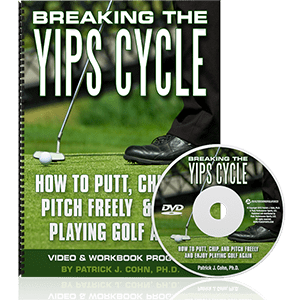
Change Your Reactions to Bad Shots
“How can I control my emotions after a bad shot?” “How can I manage my emotions so my emotions don’t take over and ruin my game?”
Those are common questions that many golfers ask on our Mental Game of Golf Survey.
Some golfers seem to take on a different persona when they hit a bad shot.
For example:
- The “smasher” pounds their club into the ground after a bad putt.
- The “thrower” hurls their driver into the air after their ball lands among the trees.
- The “breaker” ruins their club by breaking it over their knee after an errant drive.
- The “yeller” curses, grunts, moans after hitting the ball in a sand trap.
Intense, seemingly out of control emotions create tension in your mind and body.
Rampant negative emotions make focusing difficult. When you experience intense negative emotions, your thoughts become intrusive distractions, your decision making is called into question, your confidence drops, you overthink, over analyze, and you become anxious.
Negative emotions cause your muscles to tense, your breathing to quicken, your grip on the club to tighten, your ability to relax becomes practically impossible, your hands sweat, your stomach feels queasy.
You interpret those physical symptoms and say, What is wrong with me? Why does my swing feel so tight?” The cycle continues until your entire game feels labored and uneasy.
How in the world is it possible to play your best golf when you are experiencing these challenging effects due to unchecked negative emotions?
It seems impossible to remain calm after a bad shot, right? Bad shots will happen, but negative emotions do not have to follow.
Emotions can be dealt with in two ways:
1. You can learn to keep an even keel by focusing on, “What is next?” When you focus on your next shot, you see the next shot as though it is your job, “What do I need to do to put myself in best position to play my next shot?” This approach helps your poise and keeps you grounded in the present.
2. You can also learn to relax when you feel your emotions starting to bubble to the surface. Having a reliable relaxation strategy can help de-clutter your mind of negative intrusive thoughts and relax your body so you can freely swing your golf club.
A word of caution… The two mental skills of focusing on the next shot and relaxing your mind/body require practice. These mental skills are not magic solutions that suddenly appear out of the blue when needed. When you practice these mental skills, you will feel more confident in tougher situations.
Top-ranked Jon Rahm has displayed some negative outbursts during PGA tournaments. But Rahm is working to manage his emotions to play consistent golf and reach his true potential on the Tour.
RAHM: “I’ve been working on [managing my emotions] really, really hard since 2014. It’s a process. With this being a work in progress [working on keeping emotions in check], what people don’t see is the reason why I’m so happy now and one of the reasons why I’m so consistent and playing better, maybe one of the reasons why the bad weeks aren’t so bad.”
Managing your emotions helps you conserve your energy, increase confidence and shoot lower scores on a more consistent basis…
And as an added benefit, you will be more passionate and enjoy your time on the golf course.
Controlling Your Emotions when Playing Golf
Golfers become upset when they fail to play to their expectations–for shot-making and scoring.
Start by assessing what expectations you take onto the golf course. Instead, commit to executing your preshot routine, not perfect shots.
Next, you want to change your reaction to bad shots. Instead of saying… “I should never three-putt from 20 feet,” Tell yourself: “I’m not perfect. Stuff happens, move on to the next hole.”
Related Golf Psychology Articles
- How Top Golfers Manage Pre-Round Worry
- How to Manage Negative Thoughts
- Rule Over Your Emotions on The Golf Course
- Subscribe to The Golf Psychology Podcast on iTunes
- Subscribe to The Golf Psychology Podcast on Spotify
Discover How to Break the Yips Cycle

know you are frustrated with your putting, chipping, or pitching and have considered giving up the game you once loved to play. But before you make that decision, read what I have to say about how I help golfers overcome the yips….
The first place to begin to break the Yips Cycle is to admit that the yips are a mental issue. Stabbing or flinching at impact are symptoms of bigger issues: fear and over control. Changing your grip, putter, swing, club, or routine are only temporary Band-Aids to a mental game issue.
“Breaking The Yips Cycle” is a complete brain dump of the TOP NINE mental training sessions I do with my personal coaching students to help them overcome the yips and play with freedom again!